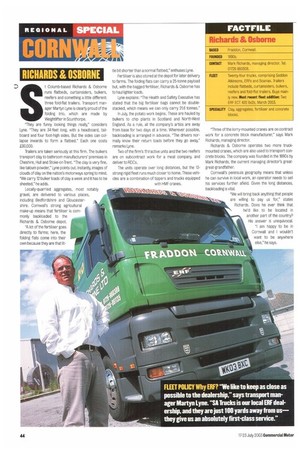RICHARDS 4S. OSBORNE
Page 44

If you've noticed an error in this article please click here to report it so we can fix it.
St Columb-based Richards & Osborne runs flatbeds, curtainsiders, bulkers, reefers and something a little different: three fold-flat trailers. Transport manager Martyn Lyne is clearly proud of the folding trio, which are made by Weightlifter in Scunthorpe. "They are funny looking things really," considers Lyne. "They are 34-feet long, with a headboard, tailboard and four foot-high sides. But the sides can collapse inwards to form a flatbed." Each one costs £30,000.
Trailers are taken seriously at this firm. The bulkers transport clay to bathroom manufacturers' premises in Cheshire, Hull and Stoke-on-Trent. The day is very fine, like talcum powder,' Lyne points out. Instantly, images of clouds of clay on the nation's motorways spring to mind. We carry 12 bulker loads of clay a week and it has to be sheeted," he adds.
Locally-quarried aggregates, most notably gravel, are delivered to various places, including Bedfordshire and Gloucestershire. Cornwall's strong agricultural make-up means that fertiliser is commonly backloaded to the Richards 86 Osborne depot.
"A lot of the fertiliser goes directly to farms; here, the folding flats come into their own because they are that lit
tle bit shorter than a normal flatbed," enthuses Lyne.
Fertiliser is also stored at the depot for later delivery to farms. The folding flats can carry a 25-tonne payload but, with the bagged fertiliser, Richards & Osborne has to haul lighter loads.
Lyne explains: 'The Health and Safety Executive has stated that the big fertiliser bags cannot be doublestacked, which means we can only carry 21.6 tonnes."
In July, the potato work begins. These are hauled by bulkers to chip plants in Scotland and North-West England. As a rule, all the company's artics are away from base for two days at a time. Wherever possible, backloading is arranged in advance. "The drivers normally know their return loads before they go away," remarks Lyne.
Two of the firm's 11 tractive units and the two reefers are on subcontract work for a meat company, and deliver to RDCs.
The units operate over long distances, but the 13strong rigid fleet runs much closer to home. These vehicles are a combination of tippers and trucks equipped with HMF cranes. "Three of the lorry-mounted cranes are on contract work for a concrete block manufacturer," says Mark Richards, managing director.
Richards & Osborne operates two more truckmounted cranes, which are also used to transport concrete blocks. The company was founded in the 1890s by Mark Richards, the current managing director's greatgreat-grandfather.
Cornwall's peninsula geography means that unless he can survive in local work, an operator needs to sell his services further afield. Given the long distances, backloading is vital.
"We will bring back anything that people are willing to pay us for," states Richards. Does he ever think that he'd like to be located in another part of the country? His answer is unequivocal. "I am happy to be in Cornwall and I wouldn't want to be anywhere else," he says.
















































































































































































